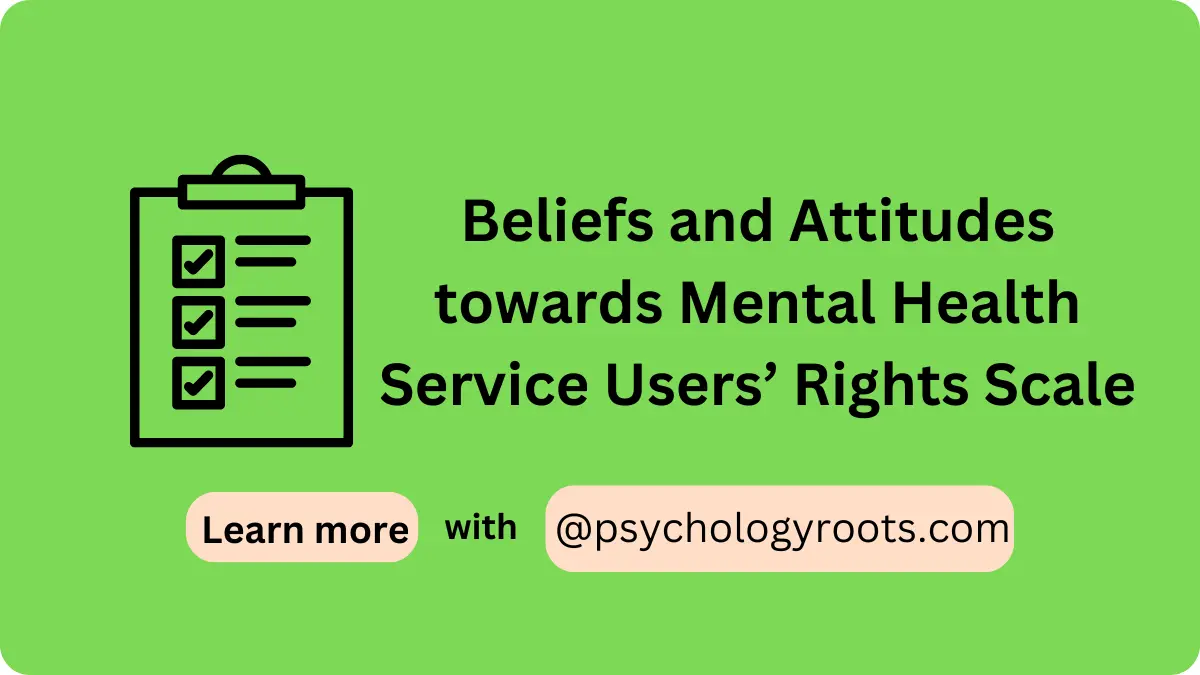Table of Contents
Beliefs and Attitudes towards Mental Health Service Users’ Rights Scale
Here in this post, we are sharing the “Beliefs and Attitudes towards Mental Health Service Users’ Rights Scale”. You can read psychometric and Author information. We have thousands of Scales and questionnaires in our collection (See Scales and Questionnaires). You can demand us any scale and questionnaires related to psychology through our community, and we will provide you with a short time. Keep visiting Psychology Roots.
About Beliefs and Attitudes towards Mental Health Service Users’ Rights Scale
Scale Name
Beliefs and Attitudes towards Mental Health Service Users’ Rights Scale
Author Details
Francisco José Eiroa-Orosa and Laura Limiñana-Bravo
Translation Availability
Spanish
Background/Description
The Beliefs and Attitudes towards Mental Health Service Users’ Rights Scale was created to measure mental health professionals’ beliefs, attitudes, and perceptions regarding the rights of service users. As mental health services evolve to focus more on patient rights, autonomy, and shared decision-making, it becomes essential to understand how professionals view these rights.
This scale helps identify potential gaps in understanding or support for the rights of service users, including issues like informed consent, confidentiality, and the right to refuse treatment. Understanding these attitudes is crucial for improving the relationship between service providers and users, ensuring ethical practices in mental health care, and promoting mental health users’ empowerment.
Purpose
The scale is intended to be used in research, training, and professional development settings to assess and improve professionals’ awareness and attitudes toward users’ rights. It is also useful for identifying training needs related to human rights and mental health.
Administration, Scoring and Interpretation
- Format: The scale consists of a series of statements related to mental health service users’ rights. Respondents indicate their level of agreement or disagreement with each statement on a Likert scale.
- Respondents: The scale is designed for mental health professionals, including psychologists, counselors, psychiatrists, social workers, and other service providers who work with individuals experiencing mental health issues.
Reliability and Validity
The Beliefs and Attitudes towards Mental Health Service Users’ Rights Scale has been validated through psychometric testing, ensuring its reliability and accuracy in measuring the attitudes of mental health professionals. The scale has demonstrated strong internal consistency and has been used in various settings to assess professionals’ beliefs in different cultural contexts.
Available Versions
25-Items
Reference
Limiñana-Bravo, L. (2018). An Instrument to Measure Mental Health Professionals’ Beliefs and Attitudes Towards Service Users’ Rights.
Eiroa-Orosa, F. J., & Limiñana-Bravo, L. (2019). An instrument to measure mental health professionals’ beliefs and attitudes towards service users’ rights. International journal of environmental research and public health, 16(2), 244.
Important Link
Scale File:
Frequently Asked Questions
What does the Beliefs and Attitudes towards Mental Health Service Users’ Rights Scale assess?
It assesses mental health professionals’ beliefs and attitudes toward the rights of service users, such as autonomy, informed consent, and confidentiality.
Who is the target audience for the scale?
The scale is designed for mental health professionals, including psychologists, psychiatrists, counselors, social workers, and others working with individuals experiencing mental health issues.
How are the responses scored?
Responses are rated on a Likert scale, with higher scores reflecting more supportive beliefs and attitudes toward service users’ rights.
What is the purpose of the scale?
The scale is used to identify areas where mental health professionals may need further training or awareness regarding service users’ rights, helping to promote ethical and user-centered practices.
Is the scale reliable and validated?
Yes, the scale has undergone psychometric validation and is reliable in assessing professionals’ beliefs about service users’ rights.
Disclaimer
Please note that Psychology Roots does not have the right to grant permission for the use of any psychological scales or assessments listed on its website. To use any scale or assessment, you must obtain permission directly from the author or translator of the tool. Psychology Roots provides information about various tools and their administration procedures, but it is your responsibility to obtain proper permissions before using any scale or assessment. If you need further information about an author’s contact details, please submit a query to the Psychology Roots team.
Help Us Improve This Article
Have you discovered an inaccuracy? We put out great effort to give accurate and scientifically trustworthy information to our readers. Please notify us if you discover any typographical or grammatical errors.
Make a comment. We acknowledge and appreciate your efforts.
Share With Us
If you have any scale or any material related to psychology kindly share it with us at psychologyroots@gmail.com. We help others on behalf of you.
